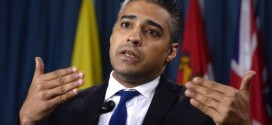There is hope for mental illness in Canada, but the system is broken
By Clay Nikiforuk- Ricochet
This tragedy has sparked conversation about mental health services in Canada, and it should.
Mental illness is a growing disability for current and coming generations, and Canada is woefully underprepared. But there is much to be hopeful about. We should use this juncture to generate openness and solutions, while being careful that our words do not reflect and further entrench stigma against mental illness.
Millions of Canadians who live silently with mental illness or addiction go unnoticed. Those who cause the most harm become infamous household names. Extreme cases of violence paint a distorted picture of the mentally ill in the collective mind, reinforcing stigma. The image of a rampaging murderer cannot taint our concept of the average Canadian living with mental illness. We cannot, at this time or any other, fall prey to the belief that people with mental illnesses are rare, dangerous or hopeless cases. Stigma itself is dangerous. It isolates the people who need support and connection, and can add to the obstacles in the way of seeking mental health services.
I can’t diagnose Michael Zehaf-Bibeau, but I don’t have to be a doctor to observe that an addiction to crack cocaine and volition to kill are not exemplary traits of a happy and healthy mind. This is not a to say that if Zehaf-Bibeau had successfully accessed treatment for his addictions and undiagnosed inner anguish, he and Nathan Cirillo would be alive today. No one can say what might have happened.
But this is an opportunity to look at a well-publicized case of a citizen going to bizarre lengths to get help.
Zehaf-Bibeau found out firsthand that it is not sufficient to simply request mental illness or addiction treatment. Canada’s reactive, two-tiered mental health system admits only those appearing to be a serious threat to themselves or others. The resources needed to treat everyone are just not there; national spending on mental health services is small compared to other economically developed countries. To manage the gap between supply and demand, gatekeepers of mental health services must triage patients. Nurses, family doctors, police and social workers decide who does and does not receive timely and free care.
Zehaf-Bibeau’s case is not one of falling through the system’s cracks. He was deemed to not be in a desperate enough state, which is a fairly usual assessment. Rather than a victim of the system’s failure, he was a victim of the system working exactly as it was designed – to keep all but the grimmest cases out.
About 3,500 Canadians die by suicide every year. That’s ten times the number of Canadians who die from the flu according to Statistics Canada.
Because of stigma and misinformation, mental illness is still portrayed as a sad, hopeless and rare phenomenon. But just the last ten years alone have seen incredible developments in treatment. Even schizophrenia, once considered the lost cause of mental illnesses, now has an effective treatment. And we know that mental illness is as common as the flu. Of Canada’s population, 10 to 25 per cent will contend with a fever this winter, whereas 10.5 per cent us will contend with mental illness.
There are, in essence, mental illness inoculations. Timely interventions can significantly reduce the chance that someone showing signs of mental illness will progress further, develop worse symptoms or turn to self-medication. When they receive appropriate, ongoing treatment, most people living with mental illnesses can recover. Many do not seek treatment in the first place due to stigma or a belief that effective help is not available. Zehaf-Bibeau was one of those who asked for help and was turned away, or perhaps put on a waitlist to see a psychologist. But those waits can be between four and 12 months long.
Having a reactive rather than proactive mental health-care system is as ethical and logical as withholding an inoculation for a common, and potentially deadly, disease. The shot is administered only if and when the supplicants are already suffering in the worst ways. It could have been so much more impactful (and cost-efficient) in the early stages.
In the coming years, the already staggering number of Canadians living with mental illness will grow. Millions of Canadians face the drab prospect of having to wait until they or their loved one’s illness reaches a critical state to receive free and timely care. Meanwhile, the cost of mental illness to the economy is a jaw-dropping $51 billion per year, and it is forecast to rise. Increasingly, mental illness is being linked with physical, professional and social problems.
We have an enormously outdated, unsustainable system, which is also high in human cost. Getting off of this crash course calls for preventative, accessible, intervention-oriented mental health care
Mental Health International is calling for workplace mandates that consider the mental health of employees. Work environments alone can cause significant stress and exacerbate mental health issues. Of interest is that Michael Zehaf-Bibeau worked in the oilfields of Alberta, a notoriously isolating and unhealthy environment.
Michael Kirby of Partners for Mental Health has suggested provincial initiatives that focus on accessible, preventative, proactive approaches to mental health, especially for children. These programs, he says, would be federally matched dollar for dollar.
Though the state of affairs is less than optimistic at the moment, I do not wish to discourage anyone from seeking help. Instead I suggest that people remain patient and persistent in their search, while forewarned of the obstacles they may face. There are a lot of reasons for hope on the horizon. We just have to keep asking.
 العربي الديمقراطي The Latest From The Arab World
العربي الديمقراطي The Latest From The Arab World





